Here are some new titles for spring, most are available now for early orders. Visit Deerbrook Editions Website. Or click on a cover to reach the book page.
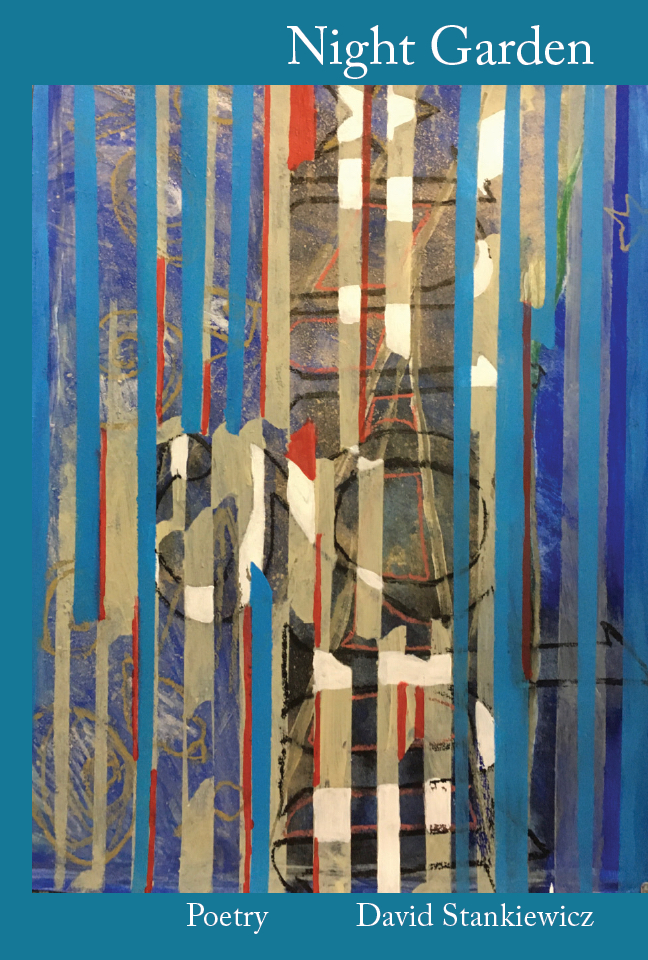

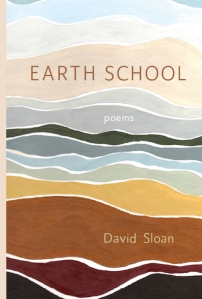

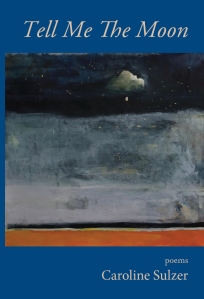







Time Out of Joint, is book III in the Argument of Time series by Teresa Carson, translated by Alessandro Di Mauro into Italian for this deluxe 8 x 11 inch bilingual edition. Publication date November 4th. Available now from Deerbrook Editions.
Here is a preview.
COLLECTIONS THAT RING TRUE reviewed by Mary Ellen Talley
Asheville Poetry Review; volume 29, no. 1, 2022, issue 31
As we enter the pages of Martina Reisz Newberry’s fifth collection, Glyphs, the poems weave their way seamlessly, without section breaks, as poems amplify and echo one another. Newberry leans toward free verse poems that sing via ekphrasis, urbanity, and waves of wind and water. She often employs syllabics, repetition, and changing lineation. A Californian by birth, her poems revel in the veritie of Los Angeles, demonstrating her devotion to the city that has long been her home.
Newberry’s cultural and landscape references often refer to LA whether she mentions the City of Angels, by name or not. The poem, “Green Things,” tells of Mexican gardeners coming “in their trucks” and how “the gauzy atmosphere will part for them.” The title, “Asphalt” speaks of suspicions, “I park those fears / in deserted parking lots.” Another poem, “Into the Skid,” packs a punch as it refers to loss of virginity, a breath mint paired with a condom, “leashed” passion, and someone who called it all an “orchestrated hoax.” One superbly visual poem, “Slouched Against a Stair Rail,” is a narrative that depicts a grimy man on Wilshire Boulevard thanking the poet for a cigarette in flawless French:
I offer him a pack of Ovals.
He smiles a one-toothy smile. Then look!
takes a cigarette holder from
his pocket and inserts my offering,
waits for my lighter. Now think on this:
a homeless dude holding that ciggie
aloft in a somewhat elegant
holder and waving me off. He said,
Merci pour la cigarette. Je vous
remercie de votre beauté et
de votre générosité.
With perfect timing, the poem on the next page in the collection, “Opus #22,” performs analytical surgery on modern malaise. “I have said before that we pray to a god / we do not love for / those we do love.”
Glyphs includes many ekphrastic poems about works of art. Two poems about love and landscape appear midway on facing pages. In “Toward the End,” which refers to an early photograph of a nude, the speaker states that behind her, “out the window, / the landscape rippled, melted into / itself.” However, “Bar Room Kiss” is a persona poem of interior landscape from the viewpoint of a woman at a bar depicted in a modern figurative painting. “You put your head down next to mine, met / my face and kissed me right there / at the table.”
Newberry’s poems continue to echo one another. The ending of “Bar room Kiss” resonates ten pages later in the poem, “Watching a Lone Priest On Live Camera [Empty] St. Raphael of Brooklyn Orthodox Church During the Corona Virus Quarantine.” Both poems similarly end with a “whisper” of “tomorrow,” one a question and the other declarative. From notes or the poems themselves, some of Newberry’s most beautiful poems weave ekphrasis with memoir.
After reading an ecstatic depiction of a concert, I, as reader, was eager to check it out on YouTube. Rereading the poem “Luciano Pavarotti Sings ‘Nessun Dorma'” while watching his performance made me feel the thrill that had arrested Newberry.
A mystery character, Sadie, recurs in some of Newberry’s poems. Could she be an invented muse or a composite LA resident? In “Sadie’s Dance,” the poet responds to Sadie’s query about a physician’s eye contact, with an observational simile, “We / reach out to each other then back away / like sheer curtains at an open window.”
Newberry also uses repetition of a motif or word to build structure of theme. Images of wind and water traverse pages of Glyphs, making the progression through the collection more wavelike than linear. For example, in “We’re Not Going To Talk About The Wind:”
My father said the wind was just a
noisy reminder that we are all
leaving this life the same way we came
into it: . . . full of sound and fury,
signifying . . . Hell! You know the rest.
The point is not to be afraid.
The first poem of the collection, “Chorus,” anticipates a gutsy honesty as it begins, “My new cocktail of choice is Anisette and Anxiety” and includes, “I am bent by all my steam-rolled sins’ / a flattened shadow, a cocker spaniel rather than / the smart, sleek Doberman I’ve always wanted to be.” In a beautiful circularity, the final poem, “Gibbous Moon,” includes the word anxiety:
The places in my soul where I kept secrets
are taken up with anxiety in regards
to my own mortality. The dark is that place
where I search every corner for my wrongdoings,
where (often on my knees) I beg forgiveness–
from you who read this.
Toward the end of the book, Newberry’s poem, “Deference,” announces: “Today I will look for astonishment / damned if I won’t!” She adds, “I will invent a new language of praise today.”
Surely a praise poem can be an act of defiance!
If book titles are doorways into themes and glyphs are arbitrary symbols, each of Newberry’s poems are glimmers into her world. With images of water and wind susurrating through the collection, these bits of information and each poem function as glyphs or hieroglyphs. Another clue toward Newberry’s point of view emerges as the poem “That Hour” begins: “The hour between dog and wolf / is ripe with trepidation.” The hour between dog and wolf is the hour of twilight but also refers to risk taking. Newberry’s poems hint at both directly and metaphorically.
Newberry’s references to symbols allude to disjunctions between real life events and the words/symbols used to depict them. Franklin’s Buddhist concept of full emptinessseeks to distinguish between the way things appear and the way they actually are. Both poets here study life to pursue these connections as they continue to address life head on.
The beauty of language and the sage wisdom of mindful lives resonate within these poetry collections. Jeffrey Franklin’s rhythm and rhymes, along with Buddhist concepts complement Martina Reisz Newberry’s free verse of urban Los Angeles. Both poets reflect on their journeys through the world and find the most healing response is praise. Kudos to both poets for enriching the world by sharing their gifts.
Other books by Martina from Deerbrook Editions:
Blues for French Roast with Chicory
Twice-Born World: Stories of Lithuania by Wendell Mayo appears in the Mid-American Review Volume XLII, Number 1. Reviewed by George Looney, it begins on page 133. There is no link to anything yet on the MAR Website, and we may have gotten a pre-published bound copy. I did make a composite of the review from scans of the text to post here.
It is a favorable review in which Looney calls this a “startling collection,” and that, “Wendell Mayo was a marvelous storyteller, and the full range of his repertoire— . . . —all are on display in this posthumous collection.”
Twice-Born World is available from Deerbrook Editions and from spdbooks.org, our distributor.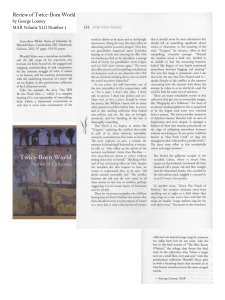
 LR Berger’s latest book came out almost two years ago, but reading it now is still as moving and pleasurable as it was in 2021. I’ve been going back to recent titles and posting poem pages with the consideration that people like reading poems right in the post, and with hope that it may encourage them to visit the previews on issuu.com/deerbrookeditions or go to the Website and order a copy.
LR Berger’s latest book came out almost two years ago, but reading it now is still as moving and pleasurable as it was in 2021. I’ve been going back to recent titles and posting poem pages with the consideration that people like reading poems right in the post, and with hope that it may encourage them to visit the previews on issuu.com/deerbrookeditions or go to the Website and order a copy.
L.R. Berger’s work has been supported by The National Endowment for the Arts, The PEN New England Discovery Award and The New Hampshire State Council on the Arts. She was Visiting Artist at The American Academy in Rome, and has been granted residencies at The MacDowell Colony, The Blue Mountain Center, Hedgebrook, Wellspring House and The Hermitage. Her collection of poems, The Unexpected Aviary, received the Jane Kenyon Award for Outstanding Book of Poetry.
Here are a couple of spreads from the book.
You can click on the spreads to view large, and use command + or – to adjust the size.
The wind in these eloquent, elegant, tensile poems is present as spirit, of course; and as spirit it can manifest as the longing or fate of the body (it expires), as intellectual momentum (it inspires), and as power for social justice (it aspires). In all these modes, L.R. Berger both controls the energy as form, and honors the charge of the moment through perception by brilliant perception, breath by mortal breath.
—Stephen Tapscott, author of From the Book of Changes, and more
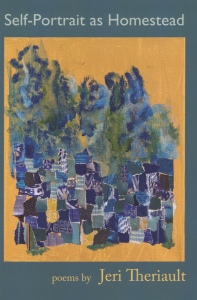 A rare collection with inventive forms
A rare collection with inventive formsThese deft, spare poems reclaim the flare of self-ness that has been tamped in women over many generations, and their fresh word-play and inventive forms make their renditions of grandmother, mother, and self-as-girl-morphing-to-elder all the more arresting. Every gesture flies off the page in its caress of language, also evoking the iconic loneliness of women in the speaker’s past and in history itself. The result? A redemptive empathy for self and ancestor, the well-earned gift of a generation of women who have paid the price of breaking free and now step forth to bear honest witness and break old patterns. Such stories cannot be told often enough. These poems do so bravely and in searingly honed phrases and images.
—Leslie Ullman, author of The You That All Along Has Housed You
View the preview of the book’s first several pages.
Some videos of Jeri reading poems on YouTube: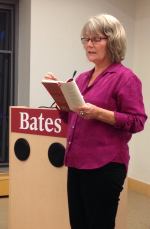
On Returning to My Childhood Church for My Father’s Funeral
The cover features artwork by the author.
Each image will go to issuu.com/deerbrookeditions where you can chose from many titles. These flip through books look exactly like the printed books. Enjoy.
It’s been a few months since we posted news about books and authors and there are several new books to look at. Shown in order of appearance, all are available now on the Website.
There are authors from four states. Toni Ortner is in VT; Donna Reis is in Warwick, NY; Wendell Mayo lived in Ohio; J.R. Solonche lives in Blooming Grove, NY; and Judith Skillman is in Newcastle, WA.
You can go to the Website via the link in the sidebar “books to buy” to the right, or you can click on a cover.
Information about authors and books appears on the book page and should be up to date. At least we try to keep it current.
Torohill’s cover features: Catskill–December, painting by David H. Drake, used with permission from the artist. www.davidhdrake.com
Subterranean Address features a painting by the author Judith Skillman.
Author Websites usually can be found on their book page, or you can try entering their name dot com, or search for it.
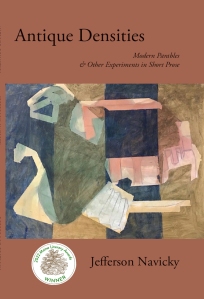
 Antique Densities: Modern Parables & Other Experiments in Short Prose by Jefferson Navicky is a winner in the Book Award for Poetry category.
Antique Densities: Modern Parables & Other Experiments in Short Prose by Jefferson Navicky is a winner in the Book Award for Poetry category.
Antique Densities: Modern Parables & Other Experiments in Short Prose is a collection that flickers between the surreal and the recognizable, between poetry and fiction, between this world and another.
Available here from Deerbrook Editions Visit the book page for endorsements.
Jefferson Navicky is the author of the story collection, The Paper Coast, and the poetic novel, The Book of Transparencies. His writing has appeared in Smokelong Quarterly, Electric Literature, Fairy Tale Review, and Beloit Poetry Journal; his short plays have been produced across New England. He has been awarded a Maine Arts Commission grant, two Maine Literary Awards, and was the 2019 winner of the Maine Postmark Poetry Contest. He is the archivist for the Maine Women Writers Collection. Visit the author’s Website

Jefferson Navicky
This question is interesting, and as most artists understand or appreciate, the possible outcomes enliven an essential creative culture, and there is plenty of evidence of this throughout art history.
As with an “ekphrastic poem” being inspired or stimulated by art, this creative inspiration can expand into or across other disciplines that can go beyond verbal description. What endures, hopefully, is an inherent sense of freedom dealing with ideas, having an abstract non representational quality, figuratively, surrealistically, and realistically, or as any imaginative, metaphorical form that stimulates or emotes.
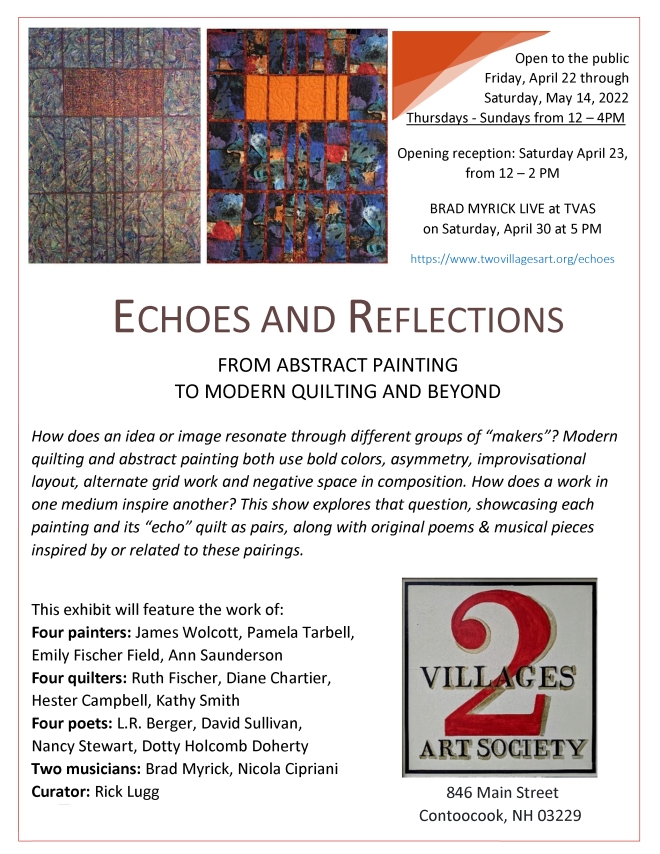
Teresa Carson has been working on a series of books, poetry of an experimental or inventive kind, one might say. Though there is more than one book, underneath the separate books is one unbroken thread, or one poem. This concept is explained by the author in the note below which is in book II.
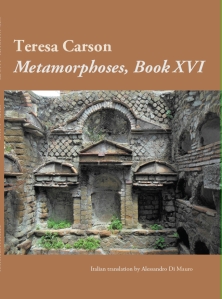
The Argument of Time {From the back matter of book II, Metamorphoses, Book XVI}
My formal education in ancient literature has amounted to little more than a sprinkling from Homer and Ovid, and my knowledge of ancient languages has been limited to phrases of response that I learned when the Roman Catholic mass was still said in Latin; nevertheless, in my fourth decade I found Ovid’s Metamorphoses and suddenly entered a genre of literature that I felt more at home in than in any other. Ovid led me to Homer led me to Vigil led me to Dante … in short, I discovered the epic form.
This deep connection to epic poetry makes sense because I am, above all else, interested in the why and how of the stories that we humans tell. Stories about ourselves, about others, about the world and the universe, about the past and the future. Stories. For more than two decades I nursed an unexpressed wish to write a modern epic.
Ostia Antica transformed that wish into reality. After having an intense experience of Time and Memory during my first visit there in 2014, the structure of a series, now titled The Argument of Time, appeared, all at once, as if in a vision. From the beginning the series was conceived as a five-book epic poem. In addition, I saw each of the five books as an epyllion, a short epic poem. Therefore, the pieces in each book connect into one poem; the five books connect into one large poem.
Now, the definition for epic in The Princeton Encyclopedia of Poetry & Poetics goes like this:
An epic is a long narrative poem of heroic action: “narrative,” in that it tells a story; “poem,” in that it is written in verse rather than prose; “heroic action,” while reinterpreted by each major epic poet, in that, broadly defined, it recounts deeds of great valor that bear consequence for the community to which the hero belongs. An epic plot is typically focused on the deeds of a single person or hero, mortal though exceptionally strong, intelligent, or brave, and often assisted or opposed by gods. Epic is set in a remote or legendary past represented as an age of greater heroism than the present. Its style is elevated and rhetorical.
On the surface The Argument of Time falls short of these requirements; while it definitely tells a story and definitely is written in verse, it does not seem to contain “heroic action,” an “epic plot,” or an “elevated and rhetorical” style; worst of all, it takes place in historical time. But what if we question the traditional definition of an epic? What if we expand that definition to allow for the actions of the community in a specific place over a period of time? What if their deeds are the stories of everyday life? What if Time itself became the hero of an epic? What if the narrative were written in a common style? All of which is exactly what I chose to do; under this new definition, The Argument of Time is an epic.
The first book in the series, Visit to an Extinct City is available. Even though this post may exceed a length some readers appreciate, we wanted to give a certain impression of these books and the work involved by more than just a cover and a blurb.
And those words of thine thus made to serve for the time, did the outward ear give
notice to unto the intelligent soul, whose inward ear lay listening to thy eternal Word.
Saint Augustine, Confessions, XI-VI
 Visit to an Extinct City, the first of five book-length poems in The Argument of Time series, was triggered by my first visit to Ostia Antica in 2014. My reason for going there was simple: I was determined not to leave Italy without visiting an extinct city, and I did not have enough time to go to Pompeii or Herculaneum. Yet from the moment I stepped through the Porta Romana, the place had an inexplicable hold on me. My daylong exploration of the ruins turned into a profound experience: everything in the landscape spoke to me. By the end of that visit, Ostia was pulsing through my veins. Back in New Jersey, I wrote down the title of all five books in The Argument of Time without any idea what the actual content of each book would be, except that it would be connected to Ostia in some way and that the poems would have to exist in English and Italian. Good fortune brought Steve Baker into my life; he approached the translation of Visit to an Extinct City with the same care and attention with which I approached the original.
Visit to an Extinct City, the first of five book-length poems in The Argument of Time series, was triggered by my first visit to Ostia Antica in 2014. My reason for going there was simple: I was determined not to leave Italy without visiting an extinct city, and I did not have enough time to go to Pompeii or Herculaneum. Yet from the moment I stepped through the Porta Romana, the place had an inexplicable hold on me. My daylong exploration of the ruins turned into a profound experience: everything in the landscape spoke to me. By the end of that visit, Ostia was pulsing through my veins. Back in New Jersey, I wrote down the title of all five books in The Argument of Time without any idea what the actual content of each book would be, except that it would be connected to Ostia in some way and that the poems would have to exist in English and Italian. Good fortune brought Steve Baker into my life; he approached the translation of Visit to an Extinct City with the same care and attention with which I approached the original.
While there are many excellent sources for detailed information about the history of Ostia, here is a brief introduction. Unlike the resort towns of Pompeii and Herculaneum, Ostia was a commercial center that served as the main port for goods coming into Rome from everywhere in the Roman Empire. By the second century a.d. its landscape was a densely packed mix of warehouses, apartment houses, temples (for various religions), baths, toilets, bakeries, and takeout food shops. Its decline from prosperous to extinct happened over a few hundred years; by the eleventh century its marble was being scavenged to build cathedrals throughout Italy. For centuries after Ostia’s abandonment, treasure hunters scoured its ruins for desirable artifacts that ended up in private collections, museums, and even the Vatican. Fortunately for us there is still much to find in Ostia. Today, systematic excavations undertaken by scientists continue to reveal its complexities and marvels.
—Teresa Carson
Each book is presented in both Italian and English. View previews of the books here.

Zoom only
Poets L. R. Berger, Peter Murphy, and Tom Schmidt will read from their original work with Q&A to follow. L.R. Berger will be reading from Indebted to Wind, Peter Murphy from Underwater, and Tom Schmidt from Like, A Metaphor. Preregister at kellogghubbard.org/poemcity.
L.R. Berger was Visiting Artist at The American Academy in Rome. Her collection of poems, The Unexpected Aviary, received the Jane Kenyon Award for Outstanding Book of Poetry. Peter Murphy is the previous Dean of Academic Affairs at Goddard College and author of Maps of Three Contintents Tom Schmidt has published two poetry chapbooks, Enough to Drink or Drown (Kelsay Books, 2020) and Like, A Metaphor (Encircle Publications, June 2021). He received a PhD from Cambridge University and taught humanities for thirty years in California, Oregon, and Vermont. Her new book is Indebted to Wind.


EXPLORING THE SACRED & THE ORDINARY WITH FOUR WOMEN POETS
Fridays May 20, 27; June 3 and 10 from 1-3:30
Instructor: Catherine O’Brian
Guest Poet: L.R. Berger
Cost: $200
In this four-week class we will explore the “Sacred and the Ordinary” with four women poets: Gwendolyn Brooks, Jane Kenyon, Lucille Clifton and Eavan Boland. I will facilitate discussions, offer writing prompts and talk about revision strategies. Guest poet and author, L.R. Berger will join us on June 3 to share a few of her own poems, her writing process and life-long appreciation for the work of Gwendolyn Brooks.
This workshop is open to everyone. You don’t need to know how to write poems and you don’t need to know anything about the poets under discussion. Please bring a journal and pen plus your curiosity and imagination. Using the Twiggs Gallery’s art exhibits and diverse poetic styles we will generate new poems in a supportive environment.
CLICK HERE TO REGISTER VIA EVENTBRITE
or call
Twiggs Gallery
603-975-0015
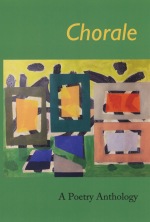 Nourished by a Maine Arts Commission Lifetime Arts Workshop
Nourished by a Maine Arts Commission Lifetime Arts WorkshopChorale had its beginning ground in 2016 with two grants for a series of poetry workshops in one of the Maine Arts Commission’s Creative Aging programs—myself recipient of the grants as the Teaching Artist. We subsequently changed the workshop group into an independent poetry one (no longer funded by the grants) and myself now an equal member of the group. —Martin Steingesser
These poets write about passages—their own and our country’s—looking deeply at the world as they find it. They investigate those profound memories that shape us throughout our lives and examine the natural world that can transform us every day. They are a community of writers, and their poems at times become a call and response, voices joined together to create images and stories that evoke and complement each other. At a time in our world when darkness feels omnipresent, these poets remind us that there is light in everything as well.
—Stuart Kestenbaum, Maine’s 5th Poet Laureate
 Today I painted the walls with the Glyphs presented in Martina Reisz Newberry’s book, Glyphs. These meditations with an acute awareness that a lot of time has passed with occasional glimpses into a fantastical world “I have wondered if he could lift / heavy objects with his mind” comes along and you wonder if it is possible. Has it always been possible? Or how about in Residue when the tree trunks are let to “…believe they are tent poles keeping the stars above us where they belong.” Yes, trees…this is your job.
Today I painted the walls with the Glyphs presented in Martina Reisz Newberry’s book, Glyphs. These meditations with an acute awareness that a lot of time has passed with occasional glimpses into a fantastical world “I have wondered if he could lift / heavy objects with his mind” comes along and you wonder if it is possible. Has it always been possible? Or how about in Residue when the tree trunks are let to “…believe they are tent poles keeping the stars above us where they belong.” Yes, trees…this is your job.
There are links between these poems and pages. Witness Martina falling off the world in Cartography 101 immediately after showing us Evelyn McHale’s famous 1947 leap off the Empire State building. Martina is building connections between herself and the world presented to her, between one poem, and the one that follows it.
There are a handful of erotic departures (and as they become more frequent we realize they may be more “returns” than “departures”) including tales of her virginity going away and a third person account of how Sadie has sex with the ocean. Sadie is present throughout Glyphs. She’s a recurring muse, an inspiration, a fantastical figure in her own right who goes about “her usual miracles.” Sadie is your companion throughout the book, her songs and miracles documented as an essential component of the overall story.
So much of the human experience of Martina’s poems resonates with me personally. The story in Starlings of the boy who had his BB gun taken away after shooting at birds reminds me of an indelibly present experience from my past when I witnessed something similar. I was in middle school and there was another boy with a BB Gun (maybe the same boy?) Undoubtedly this fueled my later vegetarianism (and anti-gun-ism for that matter) and forever idea that “apple cores will do the trick.”
Ekphrastic poems such as Street Scene and Bar Room Kiss expand on the visual of the paintings Martina is responding to (be sure to visit the links to see the originals) with expanded stories that talk to the scenes the artists portrayed an provide the perfect narration. Art was meant to talk to art and these ekphrastic glyphs are exactly the conversation they should be having.
Occasionally Martina surprises you with a word you never new existed. Cocklight for example which, makes perfect sense and will now be a permanent part of my diction.
Explanations come parenthetically. For example in Slouched Against a Stair Rail, the descriptive “purple” is followed by “(purple)” in an effort to make you fully understand she wasn’t kidding about the purpleness present in the sports coat. Sometimes the parenthesis are not closed (See Welcome Mat) blurring the conversation between poem and clarification. Walls are being torn down in these poems for you to be able co-exist in multiple worlds, and perhaps not fully knowing which one you are in.
In Welcome Mat, Martina tells us “nor have I felt sin / in any of it.” There are no regrets in these poems, only confident musings about what has been done, and what has been imagined.
Like Pavarotti whose presence is only protruding slightly into Los Angeles as he sings from the greater realm of wherever he truly exists, Martina presents her elevation over this world in a way that resonates with any artist’s filter…or to the common-person who hasn’t yet discovered their inner muse. These poems shine a light for them, and all of us, into realms we are glad to have revealed.
Reading these poems is like walking through a city’s neighborhoods…each neighborhood with its own characteristics. You’re on the same walk and you can see the connection as you turn a corner from one poem/page/street to the next, even though the one you’ve ended up on tells a different story, and smells and sounds different.
Borders begins with “I am here to astonish you”…most of the way through the book. I’m torn at what must be the launch into Glyph’s denouement, between the idea that the book could have begun with this poem, and the realization that, this far through, I have been astonished.
Rick Lupert, author of God Wrestler: A Poem for Every Torah Portion, and The Tokyo-Van Nuys Express
Rick Lupert has been involved in the Los Angeles poetry community since 1990. He is the recipient of the 2014 Beyond Baroque Distinguished Service Award for service to the Los Angeles poetry community. Visit his site
Stricken; Poems in the Time of Covid by Gail Gauldin Moore. Publication, April 12
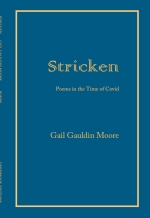 Gail Gauldin Moore’s ‘Stricken’ is truly captivating. It’s also perfectly timed for a society shaken by all manner of plagues. “Eternity,” she writes, “is a spasm in a Petri dish.” Everywhere throughout this collection, Moore’s poetry is at once prescient and inquisitive, deftly embodying the beguilement of the day. At it’s heart, however, it is a study of personal loss, a tribute to love’s inevitable wound. “For me, the best thing now / is coping with the worst thing.” There is potent medicine here. Moore is at the height of her art.
Gail Gauldin Moore’s ‘Stricken’ is truly captivating. It’s also perfectly timed for a society shaken by all manner of plagues. “Eternity,” she writes, “is a spasm in a Petri dish.” Everywhere throughout this collection, Moore’s poetry is at once prescient and inquisitive, deftly embodying the beguilement of the day. At it’s heart, however, it is a study of personal loss, a tribute to love’s inevitable wound. “For me, the best thing now / is coping with the worst thing.” There is potent medicine here. Moore is at the height of her art.
—Brendan Constantine, author of ‘Dementia, My Darling’
Gail Gauldin Moore’s new collection of poems, Stricken , takes us to the deepest places grief can touch inside our lives. The death of her son, Michael, opened a chasm of sadness and loneliness that one hesitates to look into, but look into that chasm Ms. Moore does and we look into it with her, one heartfelt poem at a time.
Gail Gauldin Moore pulls us into the embrace of poignancy, and the confusion of disbelief in the demon Mortality.
In the poem, For Michael: 1926-2020 , she says: “The unbearable cannot be borne./The deepest logic is a scream./I stand here beside myself, screaming.”
Moore’s poignancy, her search for comfort during a comfortless time, bids us look into our own fears of death, our own caves of loneliness.
In the title poem, Stricken , Moore delivers to us a feeling we know and now have permission to own: “What was this death they say you had/ My son! My son!/Call for the messenger./Call for the day when you first came.”
Stricken holds us up to ourselves. You’ll think about this book, feel it’s pain, recall the griefs and grievances of our own lives. You’ll go back to this book many times—physically and in your dreams—for a very long while.
—Martina Reisz Newberry, author of Blues for French Roast With Chicory
Stricken is literally breathtaking. Gail Gauldin Moore simultaneously shocks and caresses us. As always with this poet, her sensibility is highly refined but never “precious”–raw, even searing, while still intelligible and keenly thoughtful. Whether addressing the state of our culture during the pandemic or the loss of a grown son, these poems move with the obsessiveness, sorrow, quirkiness and unbounded passion for life that we get from the Argentine Tango. From the title poem: “Someone said you were dancing./ I wanted to be in the dance./ I wanted to bivouac with toy soldiers./ Or sleep forever—just to dream/ that life would come back.”
If I could have only five poetry books, this would be one.
—Marjorie Power, author of Sufficient Emptiness
 Chorale; A Poetry Anthology by ten Maine writers. publication April 26th
Chorale; A Poetry Anthology by ten Maine writers. publication April 26th
Details on this titles will be forthcoming, but as the title suggests, this book is a chorus of voices of varied tenor and style.
Endorsed by Maine’s 5th poet Laureate Stuart Kestenbaum
These poets write about passages—their own and our country’s—looking deeply at the world as they find it. They investigate those profound memories that shape us throughout our lives and examine the natural world that can transform us every day. A community of writers, their poems at times become a call and response, voices joined together to create images and stories that evoke and complement each other. At a time in our world when darkness feels omnipresent, these poets remind us there is light in everything.

Glyphs, poetry by Martina Reisz Newberry publication May 10th
Reading these poems is like walking through a city’s neighborhoods…each neighborhood with its own characteristics. You’re on the same walk and you can see the connection as you turn a corner from one poem/page/street to the next, even though the one you’ve ended up on tells a different story, and smells and sounds different.
Martina presents her elevation over this world in a way that resonates with any artist’s filter…or to the common-person who hasn’t yet discovered their inner muse. These poems shine a light for them, and all of us, into realms we are glad to have revealed.
—Rick Lupert, author of God Wrestler: A Poem for Every Torah Portion, and The Tokyo-Van Nuys Express
What pulses in us? asks poet Martina Reisz Newberry in her collection, Glyphs. With a sensibility reminiscent of Nobel Prize winner Wisława Szymborska, Newberry employs a deceptively conversational tone to wield resonant insights about the spirit of nature, faith, aging and mortality, and love. She continually surprises with imagery, juxtaposition, and personification, as in “A Bargain of Earthly Delights”: Boats on dark water…seem to me like beings without a future.
—Terry Wolverton, author of Ruin Porn and founder of Writers at Work-a creative writing center
One delightful feature of this collection is that Martina Reisz Newberry can sing to the wind, the sea and the stars then turn around and write a tribute as strikingly specific and sharply observed as “Small Spring on the Property,” which tells the tale of “Hazel,” who resided in “a trailer in Bentonia, Mississippi/on an acre of land owned by a great-uncle…” where she hid “…from her ex/who threatened to kill her if he ever found her/for taking their big screen t.v. with her/when she left him for the last time,/while he showered.”
Whether shadowed by doubt or traced with a feminist sense of injustice, whether wistful or exultant or humorous, however various the subject matter, the poems of Glyphs have this in common: a sense of wonder at existence and Martina Reisz Newberry’s generous and forgiving passion for life.
—Suzanne Lummis; lives in Los Angeles where she is the director of the Los Angeles Poetry Festival, award-winning teacher with UCLA Extension Her most recent book is “24 Hours.”
Publication May 20th
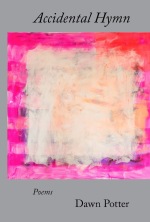
In addition to her marvelous craft and her patent relish of language, Dawn Potter impresses by the sheer range of her enterprise. She can write about Paganini and Otis Redding, compose wrenching narratives (“Mr. Kowalski”) and witty conceits (“Love Poem from a Tiny Husband”), terse, almost haiku-like lyrics (“Dooryard”) and gritty realist observations (“Walking into Town”). But whatever her approach, the poet is marvelously and rightfully self-assured, and the reader is immeasurably schooled in what our world is about in all its facets. A brilliant collection!
—Sydney Lea, Vermont poet laureate (2011–15)
In Accidental Hymn, Dawn Potter masterfully demonstrates how opposites can be counterparts and how poetry can rise from that tension/partnership. Potter bends syntax into distinctive harmonies and bangs songs loose from the everyday world, as if it were a can she’s playing with the stick of her resolute gaze. This is a fascinating and engaging collection, full of immediate pleasures and the deferred joys that visit a reader long after reading such a book as this. Accidental Hymn is a serious delight, virtuosic and welcoming at once.
—BJ Ward, author of Jackleg Opera
I’ve long been familiar with Dawn Potter’s work, and I knew this collection would showcase her careful tending of the poetic craft, would express the singular view that is present in all of her books. What I was not expecting was this explosion of power—all of it contained, just enough, to keep the covers of the book in place. This is the poetry collection I have been waiting for. As Robert Frost said, “No surprise for the writer, no surprise for the reader.” Accidental Hymn is alive with power and surprise and thrums with the energy of complex life in the time of the pandemic.
—Maudelle Driskell, author of Talismans view a preview of Accidental Hymn
Metamorphosis, Book XVI by Teresa Carson, the second book in The Argument of Time series. June 9th publication.
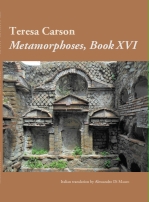 There is information on Deerbrook Editions Website about this book
There is information on Deerbrook Editions Website about this book
View a preview of this book here.
 First out in August, view a preview
First out in August, view a preview
Indebted to Wind, the new poetry collection by L. R. Berger had a successful launch at Main Street Bookends of Warner, N.H.
L. R. Berger’s work has been supported by The National Endowment for the Arts, The PEN New England Discovery Award and The New Hampshire State Council on the Arts. She was Visiting Artist at The American Academy in Rome, and has been granted residencies at The MacDowell Colony, The Blue Mountain Center, Hedgebrook, Wellspring House and The Hermitage. Her collection of poems, The Unexpected Aviary, received the Jane Kenyon Award for Outstanding Book of Poetry.
The wind in these eloquent, elegant, tensile poems is present as spirit, of course; as spirit it can manifest as the longing or fate of the body (it expires), as intellectual momentum (it inspires), as power for social justice (it aspires). In all these modes, L.R. Berger both controls the energy as form, and honors the charge of the moment—perception by brilliant perception, breath by mortal breath.
—Stephen Tapscott
In this beautiful new book, words are unusually alive and active in the poet’s capable hands. A whispered finale meaning finally, a riff on up, an exploration of the letter P : these are among the linguistic players that address both personal loss and political realities, which L. R. Berger explores with searing honesty, emotional depth, and lyric grace. No precious word is wasted here; you will read carefully and gratefully, and want to read again.
—Martha Collins
 Also in August, preview this book
Also in August, preview this book
Poisons & Antidotes, a new poetry collection by Andrea L. Fry. On October 7, there was a reading at the Grolier Poetry Bookshop in Cambridge. Andrea read with Sarah White, author of Iridescent Guest, also from Deerbrook Editions.
In Poisons & Antidotes, life is inhabited by things that kill us and things that save us. But it’s never black and white, because poisons exist on a continuum, each increment representing some gradation of toxicity. Sometimes poison is clearly recognizable; other times it sits side by side with the innocuous and the borders are blurred. In this collection, poison is a metaphor for the degree of human connectedness to the world. The delirious voices in the poems are trapped in their own subjectivity, unable to see beyond their own strange stories. Just as poison becomes less virulent across the continuum, the poetic voices acquire a gradual awareness of themselves in relation to their world. By the end of the collection, it is as if human experience also exists on a kind of continuum. The expression of this vast range of experience—with all its subtleties, contradictions and ironies—is the antidote to human disconnectedness.
Many of the poems in Andrea Fry’s new collection Poisons & Antidotes elicit a frisson as the poet, clear-eyed and with precise description, depicts plants, situations, people where the extremes of beauty and toxicity, allure and danger mingle and test us. As a practicing oncology nurse, she looks at life without sentimentality but with intense compassion, knowing that while there are no simple choices, it is the ambiguity of life that makes us fully human. Using her medical training as well as her extensive knowledge of the natural world, Fry with deft language creates pictures and tells stories that provoke our emotions and linger in the mind.
—Peggy L. Fox, President and Publisher Emerita, New Directions Publishing Corp.
Caution: this book may upend your expectations about what is fit subject matter for poetry. From mothballs to toxic machismo, Fry takes on the perils that lurk in the dark corners of the world and brings them into the light of frank consideration. These poems have their “arrows of truth” aimed straight at you. They will reshape your thoughts. They may deepen your insights. With larger doses, your imagination may experience an expansion. You may feel yourself craving more and more of the poetic artistry of Andrea L. Fry. You’ve been warned.
—Jeanne Marie Beaumont, author of Letters from Limbo, Burning of the Three Fires
Many of Andrea Fry’s poems have become my favorites, e.g., “The Renderer” and “The Secret.” I don’t know if these are the Poisons or the Antidotes of the collection. I just know they are poems—startling, fluent, and precise. They avoid overdosing us with sweetness, but they are deeply heartening. This poet seems to think (and I agree) that accurate observation is better for us than sweetness. So is humor. So is love.
—Sarah White, author of Iridescent Guest and Wars Don’t Happen Anymore
In September preview this book
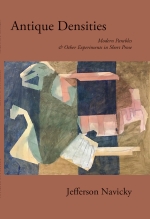 A new title of short fiction by Jefferson Navicky, could be prose poetry—here is what Jefferson Navicky says about his book: “Antique Densities: Modern Parables & Other Experiments in Short Prose is a collection that flickers between the surreal and the recognizable, between poetry and fiction, between this world and another.”
A new title of short fiction by Jefferson Navicky, could be prose poetry—here is what Jefferson Navicky says about his book: “Antique Densities: Modern Parables & Other Experiments in Short Prose is a collection that flickers between the surreal and the recognizable, between poetry and fiction, between this world and another.”
Among the many delights awaiting the lucky reader of this book, perhaps the greatest is the utter unpredictability of its language. In these pages, one encounters a diverse array of familiar figures, from pop singer Justin Beiber to legendary literary critic I.A. Richards. Like the elements of a dream, these personages are both themselves and not themselves, and as one reads one begins to wonder if one isn’t also becoming not-oneself, but someone wholly else, perhaps a character in the book’s pages. Antique Densities is a joyful counter-spell to the curse of disenchantment, a long, beautiful string of unforeseeable sentences. And as Gaston Bachelard asks in The Poetics of Space, a book that bears some secret kinship with this one, “if we render speech unforeseeable, is this not an apprenticeship to freedom?”
—Kristen Case, author of Principles of Economics and Little Arias
Antique Densities is a wild story-map of glowing imaginations, surreal hallucinations and timeless contemplations. There’s a dream-sequence to these winding narratives, one that reveals itself in layers of strange and beautiful meaning. In creating this collection, Jefferson Navicky has done that magical thing that so many writers and artists fear: he’s let his deepest literary influences wander rampant through the pasture of his consciousness, and the result is a stunning alchemy of authenticity and homage.
—Jaed Coffin, author of Roughhouse Friday
Antique Densities, short prose poems, “parables and other experiments,” are rarely more than a page in length, yet there is nothing miniature about them. First, there is the beauty of the writing: page after page of the coziest, most unsettling characters and situations thus far found, in Maine, in the 21st Century. Libraries open their doors on each page of this slim volume. You’ll see what I mean…These pages interlock, like ancient paving stone…all stories here will be found to serve each other, deeper and finer than I have known. Jefferson Navicky mentions writers he admires – Kafka, Borges, Cortazar, Yourcenar – “elders of influence.” They are no longer merely his models. With Antique Densities, Jefferson Navicky is their peer.
—Stephen Petroff, author of Philosophosphorescence
Deerbrook Editions has published Maine writers for going on 20 years. This video gives a short hit on each author and shows book covers. Go to Deerbrook Editions for more info, or to order a title, and remember, shipping is free in the USA.
Enjoy!
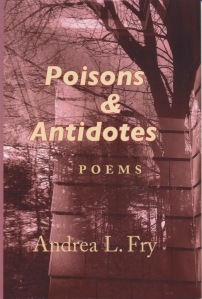 About Poisons & Antidotes
About Poisons & AntidotesIn Poisons & Antidotes, life is inhabited by things that kill us and things that save us. But it’s never black and white, because poisons exist on a continuum, each increment representing some gradation of toxicity. Sometimes poison is clearly recognizable; other times it sits side by side with the innocuous and the borders are blurred. In this collection, poison is a metaphor for the degree of human connectedness to the world. The delirious voices in the poems are trapped in their own subjectivity, unable to see beyond their own strange stories. Just as poison becomes less virulent across the continuum, the poetic voices acquire a gradual awareness of themselves in relation to their world. By the end of the collection, it is as if human experience also exists on a kind of continuum. The expression of this vast range of experience—with all its subtleties, contradictions and ironies—is the antidote to human disconnectedness.
Many of the poems in Andrea Fry’s new collection Poisons & Antidotes elicit a frisson as the poet, clear-eyed and with precise description, depicts plants, situations, or people, where the extremes of beauty and toxicity, allure and danger mingle and test us. As a practicing oncology nurse, she looks at life without sentimentality but with intense compassion, knowing that while there are no simple choices, it is the ambiguity of life that makes us fully human. Using her medical training as well as her extensive knowledge of the natural world, Fry with deft language creates pictures and tells stories that provoke our emotions and linger in the mind.
—Peggy L. Fox, President and Publisher Emerita, New Directions Publishing Corp.
Caution: this book may upend your expectations about what is fit subject matter for poetry. From mothballs to toxic machismo, Fry takes on the perils that lurk in the dark corners of the world and brings them into the light of frank consideration. These poems have their “arrows of truth” aimed straight at you. They will reshape your thoughts. They may deepen your insights. With larger doses, your imagination may experience an expansion. You may feel yourself craving more and more of the poetic artistry of Andrea L. Fry. You’ve been warned.
—Jeanne Marie Beaumont, author of Letters from Limbo, Burning of the Three Fires
Many of Andrea Fry’s poems have become my favorites, e.g., “The Renderer” and “The Secret.” I don’t know if these are the Poisons or the Antidotes of the collection. I just know they are poems—startling, fluent, and precise. They avoid overdosing us with sweetness, but they are deeply heartening. This poet seems to think (and I agree) that accurate observation is better for us than sweetness. So is humor. So is love.
—Sarah White, author of Iridescent Guest and Wars Don’t Happen Anymore
The 16th century physician-philosopher Paracelsus famously wrote, “All things are poison. The dose alone makes a thing not a poison.” Advanced practice oncology nurse Andrea Fry is the poetic voice of Paracelsus in the 21st century. Poisons & Antidotes is not just a work of medical humanities. Fry uses her clinical skills to diagnose and treat the human condition. Her dosing is measured, exacting, and precise. At times witty, at times disturbing, these poems span the countryside and the city, exploring innocence and shame, delight and pain, the sublime and the mundane. Fry is an important new voice in American poetry and Poisons & Antidotes is required reading for anyone serious about poetry.
—Daniel P. Sulmasy, MD, PhD
Acting Director of the Kennedy Institute of Ethics, Georgetown University
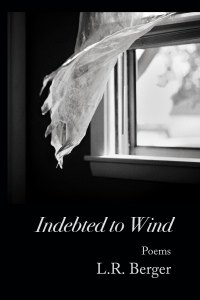 Endorsements from the back cover
Endorsements from the back coverThe wind in these eloquent, elegant, tensile poems is present as spirit, of course; as spirit it can manifest as the longing or fate of the body (it expires), as intellectual momentum (it inspires), as power for social justice (it aspires). In all these modes, L.R. Berger both controls the energy as form, and honors the charge of the moment through perception by brilliant perception, breath by mortal breath.
—Stephen Tapscott
In this beautiful new book, words are unusually alive and active in the poet’s capable hands. A whispered finale meaning finally, a riff on up, and an exploration of the letter P : these are among the linguistic players that address both personal loss and political realities, which L. R. Berger explores with searing honesty, emotional depth, and lyric grace. No precious word is wasted here; you will read carefully and gratefully, and want to read again.
—Martha Collins
L.R. Berger’s work has been supported by The National Endowment for the Arts, The PEN New England Discovery Award and The New Hampshire State Council on the Arts. She was Visiting Artist at The American Academy in Rome, and has been granted residencies at The MacDowell Colony, The Blue Mountain Center, Hedgebrook, Wellspring House and The Hermitage. Her collection of poems, The Unexpected Aviary, received the Jane Kenyon Award for Outstanding Book of Poetry.
available now for early orders
The quality of persistent attention in Berger’s work constitutes, I think, the heart of the poetic act. It matters that her attention is paid to such endangered objects as human love and the extra-human natural world; to the intricate connection between our conduct of love and that imperiled world.
—Mary Baine Campbell
Sufficient Emptiness is Marjorie Power’s new collection of poetry.
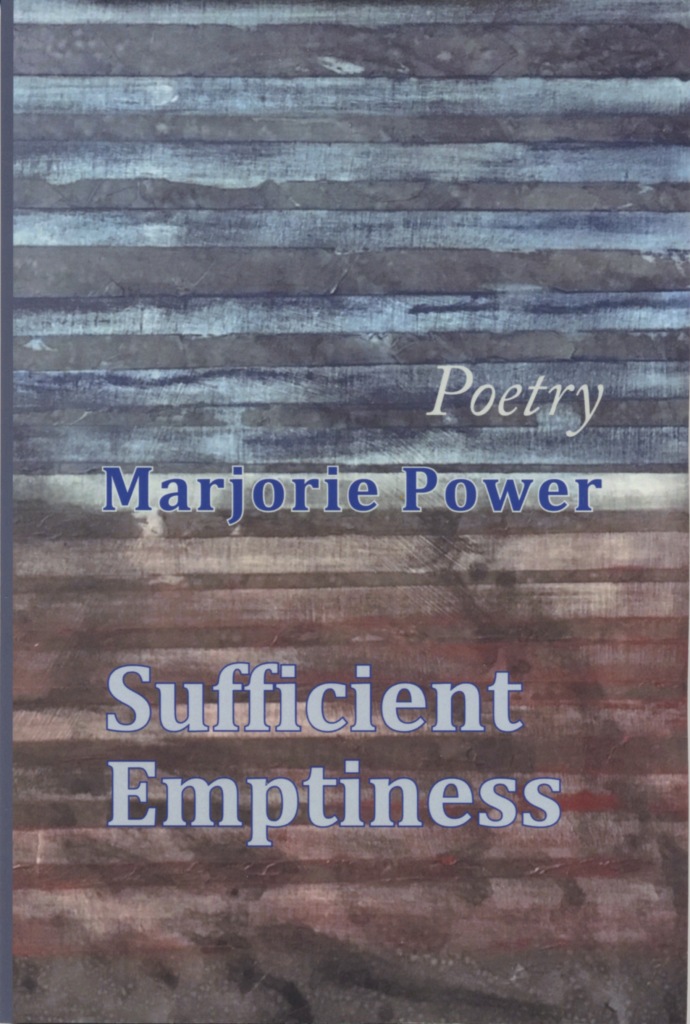
Sufficient Emptiness holds life’s contradictions in balance on the fine edge of language. With elegance and grace, Power captures moments of connection and reverie. With sly wit and savvy insight, she meditates on history, memory, and art. This is a collection of those “hushed thefts” in life that change us, as well as a roadmap of how to traverse the journey. Sufficient Emptiness is more than a book, it is the balm we need for the wound of these difficult times.
—Amy Wray Irish, author of The Nature of the Mother
Marjorie Power holds the camera like a visionary filmmaker, moving deftly between voices and locations, narrative and form, twists and omissions. Each poem in Sufficient Emptiness speaks its own distinct language as it explores its poem-world, whether it’s a family raising chickens, a landscape defined by a dominant tree species, or the reappearing face of a lost woman. These poems offer mysteries and questions without oversimplifying answers; they are not just about what we see and remember, but how we see and remember.
—Amy Miller, author of The Trouble with New England Girls
Marjorie Power is one of my favorite poets writing today. Her words, themes, and visions transform time and space and carry us back not only to her past, her family, and the people she has encountered on her journeys, but to our own past, family, and people whose paths crossed ours for a moment, a season, a lifetime. This collection also focuses on the natural world we all live in, forcing us to acknowledge our impact. The poems are powerful, usually brief, and razor sharp. They linger in your mind like crystalline visions.
—Chris Helvey, Editor-in-Chief, Trajectory Journal
With wry wit and keen observation, Power navigates a complex, ever-changing, often crazy world with grace and insight. Pointing her lens at the ironies of aging, the vagaries of grief, or losses endured by the natural world, she reframes the ordinary and the mean. She invites us to linger in a deeper place.
—Linda Strever, author of Against My Dreams
J.R. Solonche’s poetry, is well, praised by many, the likes of Stephen Cramer, Michael Meyerhofer, and Ricardo Nirenberg, to name a few. Also widely published in mags and journals for decades, J.R. has a unique perspective on many things usual, and unusual. Let the poems speak. See more about his books here.
The Porch Poems received Best Indie Book
Also a poem in “Deep Water” portland Press Herald
But read this endorsement and watch the video below.
William Faulkner is famous for mining “his own little post stamp of native soil” for what he called “the old universal truths.” In Chestnut Ridge , Dawn Potter is following Faulkner’s wise path, giving us a polyphonic portrait of southwestern Pennsylvania in an impressive range of voices, pitches, and forms. She starts with the region’s tragicomic history—“the undiagnosed roads littered with sorrows”; “the pale and ruminating / heifer”—moving gradually through time to the present. All along, mining the full possibilities of persona, our intrepid author takes possession of her own origins as melancholic witness to a bygone America whose history it would be a terrible mistake to lose. This sad, moral, and really smart book is essential reading for anyone interested in hearing a master poet sing an indispensable bereavement song.
—Adrian Blevins
Find it here, purchase with free shipping
The press is going modern with promo videos. We’re just getting started, but here is one to check out. As we get further along, the videos will become more focused on books, authors, or events.
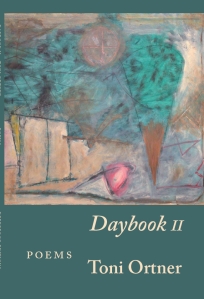 The most recent title, published last month, is from Toni Ortner of Vermont. The second in a series of prose poem collections.
The most recent title, published last month, is from Toni Ortner of Vermont. The second in a series of prose poem collections.
Toni Ortner was an English teacher at the University of Connecticut, Monroe College, and at Bronx Community College, as well as at various high schools in New York state.
She has had 26 books published by small presses. Her most recent is Daybook II by Deerbrook Editions. She lives in Vermont where on the fourth Sunday of each month from 5- 6 PM, she hosts the Write Action Radio Hour on l07.7 FM and interviews writers and has them read their work. She is Vice President of Write Action which is a nonprofit group that supports writers in New England through a variety of events. Her recent work can be seen at vermontviews.org at Old Lady Blog along with reviews of her published books. She gives readings in bookstores and libraries in Vermont and New Hampshire.
Mimi White has published four books of poetry. Her chapbook, The Singed Horizon won The Philbrick Poetry Award, selected by Robert Creeley. Her first full-length book, The Last Island won the Jane Kenyon Award for Outstanding Poetry. Her poems have appeared in dozens of journals including Poetry, FIELD, The Seattle Review, and Stonecoast Review. She has been awarded fellowships from the New Hampshire State Council on the Arts and the Vermont Studio Center. After teaching for many years in a variety of settings she is now hosting “pop-up” poetry conversations in libraries wherever people wish to come together to read and enjoy poems. Mimi White is a longtime resident of Rye NH. Mimi was also Portsmouth, NH Poet Laureate.
Her latest collection from Deerbrook Editions, The Arc Remains, is superb. It is available on the Press site.
The big news is that Mimi had a story in the New York Times Home section about being a grandparent during the pandemic.
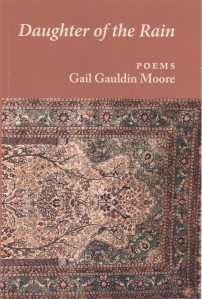 Gail Gauldin Moore lives in LA.
Gail Gauldin Moore lives in LA.
Poems in this book have previously appeared in Rivertalk, Verve, Cedar Hills Review, Brick House, Daybreak, Prophetic Voices, California Quarterly, Stepping Stones Magazine, Rise Up Review, and Stand Magazine.
These are some of her poems in Daughter of the Rain
Gail Gauldin Moore was a voiceless poet all of her life, having had writer’s block for over fifty years. She finally starting writing after a vision of a strange animal emerged from a cave and began shaking off its wool.
She was a licensed therapist for over thirty years, received a certificate in Theological Studies from Sewanee, University of the South, and was an adjunct professor for The University of La Verne.
She thinks poetry should strive to remain what it was once thought to be, “the highest of the literary arts” and likes this summation of the poetic process by Galway Kinnell:
“On some hill of despair
the bonfire you kindle
can light the great sky;
though it is true of course,
that to make it burn,
you have to throw yourself in.”
These days . . . oh these days. Some days can’t remember what I had for breakfast yesterday, but then it slowly comes to me. Boiled egg and toasted sprouted wheat bagel. And now poetry month is gone. Before it ended as a door shuts, I felt that I did not do enough for poetry. Then I thought, my poetry month lasts all year long.
So now, since more than a dozen new books sit on the shelf from last year and the new year, and though more are in the works (plans being what they are—uncertain as ever) it is time to ‘get the word out’ for all you stay-at-homers.
Some poems from Sarah White’s new book. Enjoy – available now here
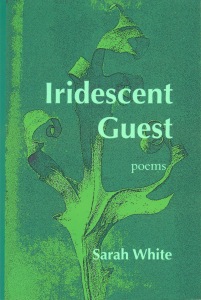 Iridescent Guest is the third book by Sarah White from Deerbrook Editions. As with most titles, previews can be found on issuu.com
Iridescent Guest is the third book by Sarah White from Deerbrook Editions. As with most titles, previews can be found on issuu.com
Sarah White is also author of The Unknowing Muse (Dos Madres Press, 2014), Alice Ages and Ages (BlazeVox, 2010), Cleopatra Haunts the Hudson (Spuyten Duyvil, 2007), Mrs. Bliss and the Paper Spouses (Pudding House chapbook, 2007), and a lyric memoir, The Poem Has Reasons: a story of far love, on-line at http://www.proempress.com. She is co-translator of Songs of the Women Troubadours, Bruckner et al., (Garland, 2000). She is Professor Emerita of French from Franklin and Marshall College, and lives in New York City.
Iridescent Guest – stunning, glinting. Striding out of the ordinary, these poems shimmer morose and joyful, ominous and light-hearted. Sarah White surveys our perilous, our exquisite world with a solvent “personhood” sans ego and pretense. The Iridescent Guest brings great self-knowledge to bear in her bouquet. . .presents no small effort of stretching and reaching to the limits in order to wreathe masterfully, both the consolation and the forlornness of our mortal coil. This guest pays homage to the art gods, the kitchen gods, and to the children — silver, mutable, delicate. . .solvent and sure.
—Karen Garthe, author of the hauntRoad, The Banjo Clock, Frayed Escort
The latest titles as of April are two new poetry books.
A Rising & Other Poems by David Sloan.
A graduate of the University of Southern Maine’s Stonecoast MFAPoetry Program, David Sloan teaches at Maine Coast Waldorf High School in Freeport. His debut poetry collection—The Irresistible In-Between—was published by Deerbrook Editions in 2013. His poetry has appeared in The Café Review, Chiron Review, Innisfree,Lascaux Review, Naugatuck River Review, New Millenium Writings, and Passager, among others.
He received the 2012 Betsy Sholl Award, MWPA Maine Literary Awards short works poetry category in 2012 and 2016, The Margaret F. Tripp Poetry Award, the Goodreads Poetry Contest a third time in July, 2015, Maine Poets Society inaugural award 2018, and has been nominated for a Pushcart Prize.
Also now available from April, The Porch Poems by J.R. Solonche.
J.R. Solonche has been publishing poetry in more than 300 magazines, journals, and anthologies since the early 70s. He is the author of Beautiful Day (Deerbrook Editions), Won’t Be Long (Deerbrook Editions), Heart’s Content (Five Oaks Press), Invisible (nominated for the Pulitzer Prize by Five Oaks Press), The Black Birch (Kelsay Books), I, Emily Dickinson & Other Found Poems (Deerbrook Editions), In Short Order (Kelsay Books), Tomorrow, Today and Yesterday (Deerbrook Editions), True Enough (Dos Madres Press), The Jewish Dancing Master (Ravenna Press), If You Should See Me Walking on the Road (Kelsay Books), In a Public Place (Dos Madres Press), To Say the Least (Dos Madres Press), For All I Know (Kelsay Books), The Time of Your Life (Adelaide Books), The Porch Poems (Deerbrook Editions), Enjoy Yourself (Serving House Books), and coauthor of Peach Girl: Poems for a Chinese Daughter (Grayson Books). He lives in the Hudson Valley.
Expanding on the post, The year in books, this post will give some details about books fresh off the presses. (Links provided to book pages for ordering, shipping in the USA is free)
First, the Maine Poet Laureate’s new title, How to Start Over, poems by Stuart Kestenbaum, includes some experimental poems using source words supplied by others (loosely might be called found poems). The cover features art by Susan Webster entitled, The letter A. Stuart Kestenbaum has other books from Deerbrook Editions.
Next is Daybook I by Toni Ortner. This is a deluxe volume at 7 x 10 in.
Toni Ortner is a poet and author who lives in Brattleboro, Vermont. She has 16 books that have been published by fine small presses, 14 of which are poetry books. She is Vice President of the Write Action Board that supports writers in New England through readings and other events. She gives readings at Vermont libraries and bookstores and reads at the Brattleboro Literary Festival. Her work has appeared frequently at vermontviews.org and she has had numerous articles published in The Commons. You can read endorsements where her book is available here on the press site
Read her column on vermontviews.
Third is a new book of poems, Chestnut Ridge by Dawn Potter. Chestnut Ridge is also a deluxe volume in 7 x 10 in. format.
“Dawn Potter’s rich and remarkable Chestnut Ridge gives us voices and artifacts tracing the development of southwestern Pennsylvania, from 1635 to 2013—from missionaries to racial conflicts, mining disasters to the way changing times can leave us adrift. Potter makes history alive and compelling.” —Betsy Sholl
Dawn Potter directs the Frost Place Conference on Poetry and Teaching. She is the author of eight books of prose and poetry, and she lives in Portland, Maine.
Over the past year, from last spring until the current spring, Deerbrook Editions has been working on nine new titles. Most of which are available if only from the press Website, but many are at the distributor, and on amazon. Most of these have come out since last fall. Last fall On The Badlands Of New Times, by Paul Bamberger of New Hampshire, appeared.
There are four new Maine authors in this group (if you go back a bit more into 2017 there are more, Combed by Crows by Dennis Camire, and one notably Lesser Eternities by Jim Glenn Thatcher, a finalist in the Maine Literary Awards for poetry).
Last spring two Maine authors appeared, Leonore Hildebrandt’s poetry Where You Happen to Be, and Margaret Yocom’s erasure poetry, KIN S FUR (ALL KINDS OF FUR),
Many of these books have been reviewed.
This new year two more Maine authors have new books coming out, Say What You Can, poetry by Elizabeth Tibbetts, and The New Plantation: Lessons from Rikers Island, creative non-fiction/memoir, by Jason Trask. There is also Maine author Dawn Potter with a new book of poems currently in prepress titled Chestnut Ridge.
There are still more books in the works for this year. One book of prose poems by Toni Ortner of Vermont, Daybook I, a deluxe size 7 x 10 format has just gone to press.
More poetry from other places include, What Lies Beyond, poems by Judith Farr of DC; Came Home to Winter, poems by Judtith Skillman of Washington; and Tomorrow, Today, and Yesterday by New York author J.R. Solonche.
To visit the Website and see what is available click here. A similar post has click on covers linked to pages, as well as drop down menus and an index.
I wanted to put this out there, a friend and author’s post of one of McGrath’s poems which spurred me on to look him up. It is the kind of thing the internet is good for, and what writing is good for, we get curious, we get inspired, we read, write and teach. It is in the blood of a creative. So here is Pauls post of Tourists at Ensenada.
You can also find some of Paul’s work there as well. He is prolific in posting poems by great poets and he occasionally posts his own poems from his book.
https://thebadlandpoems.wordpress.com/2019/02/11/tourists-at-ensenada/
Paul Bamberger, is, by the way, a serious poet in his on right. His book, On The Badlands Of New Times, published last fall by Deerbrook Editions, is, as Keith Badowski, Editor of Brick Road Poetry Press, says, ” . . . a collection filled with powerful poetry which depicts some of the most painful truths about our world.”
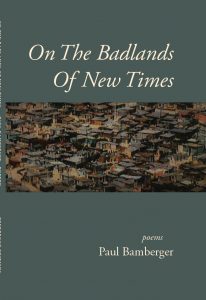
Now, here is a link to Thomas McGrath on Poetry Foundation.
https://www.poetryfoundation.org/poets/thomas-mcgrath
Lastly, it is a new year and Deerbrook Editions has new books coming off the presses. Here is a link to a few. There are more on the way, and you can browse the menus and posts to learn about the writers of Deerbrook Editions.
https://www.deerbrookeditions.com/?p=2640
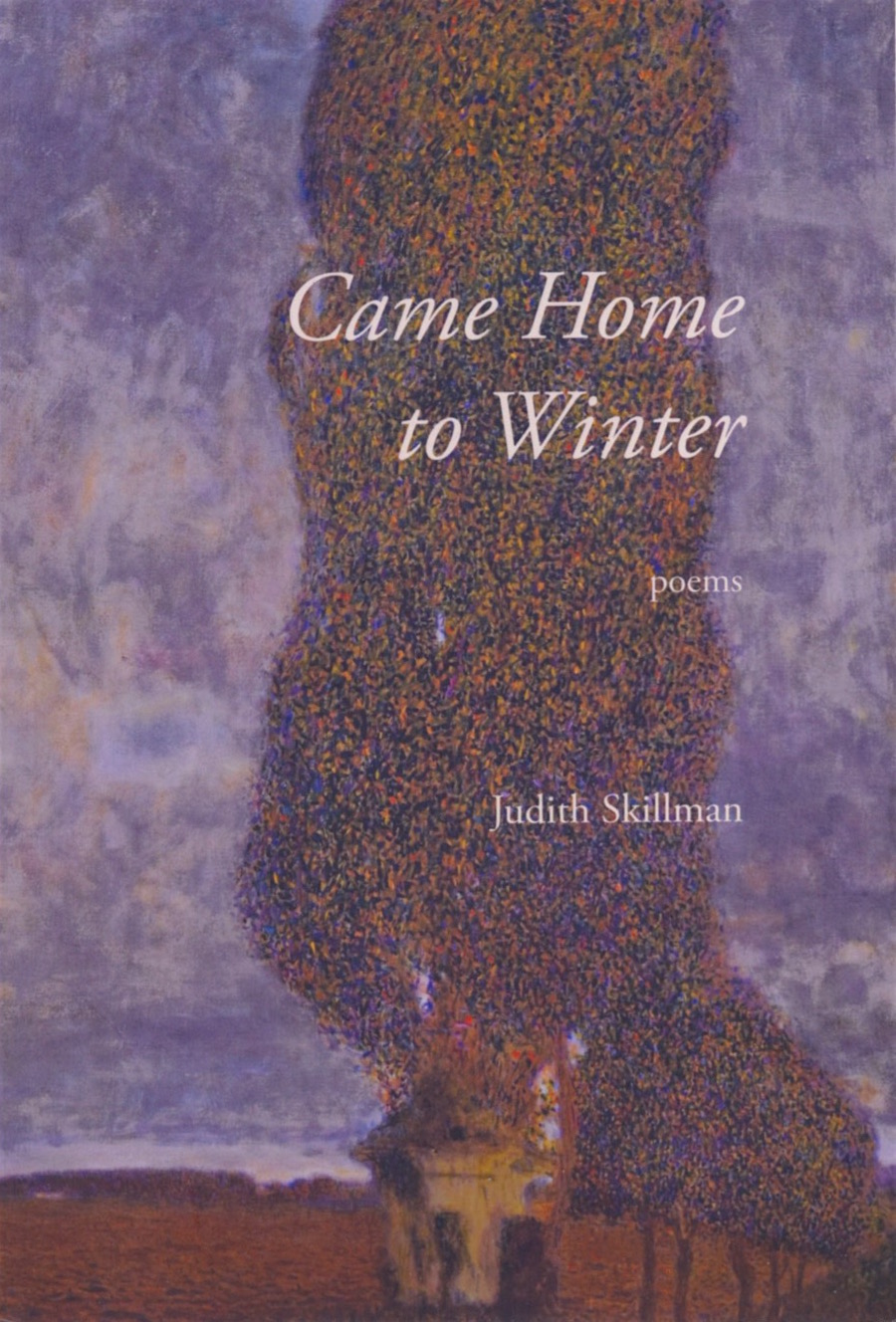



A review of Timothy Ogene’s book of poems appears in Glasgow Review of Books that speaks of the possibilities in the title, the questions, and difficulty in the condition of being as the other, from away, as some would say. There is a certain retrospect found in the state of looking forward, perhaps while looking backward we find our truth by disambiguation.
Alison Graham’s review is welcome as a sensitive look at the language and dynamics in these poems.
Published in 2016, Descent & Other Poems was included on Australian Book Review’s 2016 Books of the Year list, as well as gaining an honorable mention in the 2017 Glenn Luschei Prize for African Poetry.
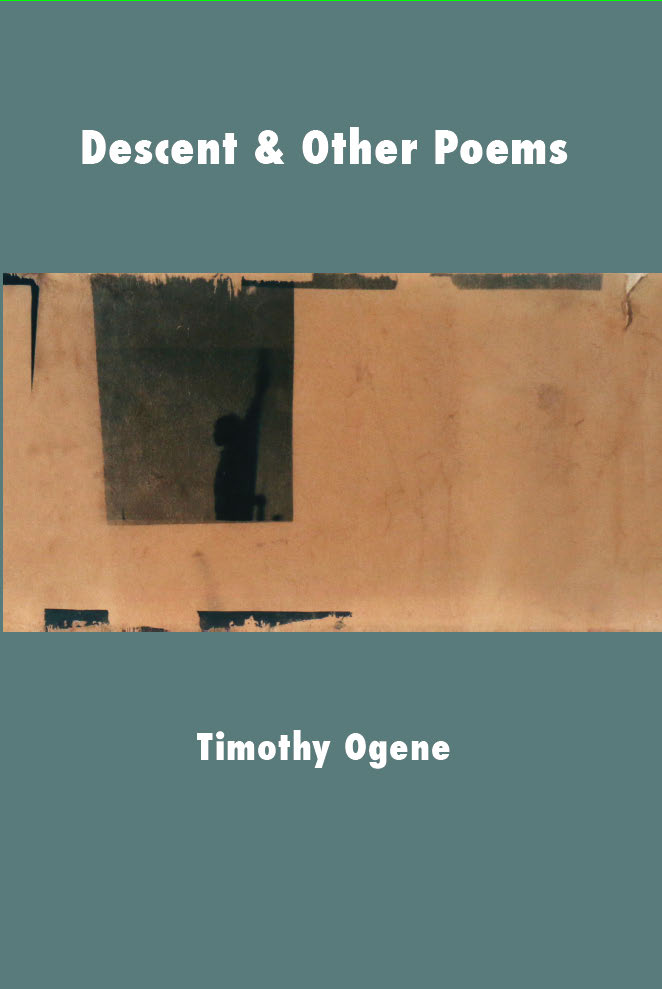
Source: One poem from the latest book, On The Badlands Of New Times
Endorsers have said Paul Bamberger’s book is “filled with powerful poetry . . . ” and, “Some of the most intelligent and challenging poems I have ever read . . . ”
Here is one poem from the beginning of the book:
Preludes To The Past
caught in the last improbable light of the pretty hour
nerve endings of paradox hum destiny’s long shot
tomorrow’s brilliant rational truth’s sharp tongue
swing of axe shadowing its own to and fro as desert
traveler crosses the slow red decay of dying sun and
small lie howls there is always something in it for
you but we who harvest wildflowers on the dark side
of the moon have our own brothers to keep
what studies we are slow steppers looking for caution
sign dreamers of lilies in shock time blind to
evening’s tomorrow no more than what meets the
eye no walk arm-in-arm dream lowered into the
dark what could have been
what are we thinking this no rags to riches story
no home sweet home let’s go home baby no sweet
dreams we got it made baby nonsense and the long
haul’s what brought us to this street multitudes
scavenging among the well-fed dogs old men pacing
cluttered rooms running out of time losing their
timing making no sense of it joyless hearts riding
their shadows down to where the rattled bones are
laughing door left ajar
and from the unlucky we steal long shots to pay off
the junkyard dog bone has its use
Here is a poem from the new book Where You Happen to Be by Leonore Hildebrandt.
In her new book Leonore Hildebrandt explores the power of place to inform, humble, and inspire our human experience.
One author said this for the back cover: In Where You Happen to Be, Leonore Hildebrandt writes of “discern[ing] layers / of sound and scent,” of probing “the human dilemma / of purpose and failure.” The poems in this collection assume this task of recognition and discovery.
Here is the opening poem from a fine book- Francis Blessington’s book Poems from Underground.
Poems from Underground is an outstanding collection, well deserving a place on any adequate shelf of contemporary poetry. T he whole book gives pleasure and stimulation. Francis Blessington brings fresh insight to every subject he touches, with a rare mastery of imagery and metaphor. Great art can inspire him (Goya’s Prints), but so can the sordid (Cockfight). His control of free verse forms is admirable, as well as his handling of traditional meter and rhyme, so well displayed in his memorable translations from Baudelaire and Mistral.
—X. J. Kennedy
Here we are in “a post-truth world” . . . a complicated world of media outlets, on the air and online, where rhetoric, jargon, imagined conspiracies, lies and deception permeate, leaving us to weed through with our educated mind and common sense, in search of bits of gnosis.
Lovers of poetry and literature in general, weed no further. There is nothing pretentious about work that is made with a love of creativity, essential observation and experience, and full with imagination.
Deerbrook Editions has a pile of new and recent titles, some which might fit into your idea of “arts and entertainment.” Because we know that there are many generations and types of readers with varying tastes, we offer most titles in a quality preview form on issuu.com, and most of these are embedded on book pages on the press Website.
Then if you find something interesting, remember that shipping is free in the USA.
It’s Poetry Month all year long at Deerbrook, and now, new books out, and more in the works.
And thank you to all visitors, likes and followers of this blog. Hoping to post some interesting poetry in the coming weeks.
SOON IT WILL BE SPRING
Soon it will be spring.
Do you know how strong spring is?
Do you know how strong it is to do what it does?
Of course you know.
You have seen spring before.
You have watched spring at work many times.
How it has to have the strength of a thousand winters
to wrestle winter to the ground,
then strangle winter with its bare hands,
then smother winter with whatever it finds at hand,
with snowdrops and crocus, to be certain,
then dig winter’s grave deep in the ground,
so deep in the ground that winter will not stir again
until next winter.
And it has only its bare hands, mind you, with which to do this.
Tell me, have you ever dug a hole with your bare hands?
I don’t mean a hole for a tulip.
I mean a hole big enough to bury winter in?
This is how strong spring has to be.
And spring does this all alone.
It gets no help, not from us.
No, not from us who merely stand around, cheering.
J.R. Solonche (110 Poems, forthcoming in the near future)
Check out the flip-thru preview and read a few poems.
//e.issuu.com/embed.html#9201165/59785547
Praise for Where You Happen to Be from Dawn Potter:
In Where You Happen to Be , Leonore Hildebrandt writes of “discern[ing] layers / of sound and scent,” of probing “the human dilemma / of purpose and failure.” The poems in this collection assume this task of recognition and discovery. Gently, and with a great and detailed patience, she walks us through physical and emotional landscapes, narrating travels that feel both in and out of time. “The living,” Hildebrandt writes, “inherit the world’s blindness— / so much of it, they get blissfully drunk.” Yet as her poems celebrate and mourn our blindness, they also remind us, again and again, of the power of resilience: “Let one lake rest on another.”
—Dawn Potter
Source: Descent & Other Poems receives 2017 Luschei Prize Honorable Mention
Descent & Other Poems also was listed as a favorite on LitHub.
Lots of recent titles of interest; check out the backlist post on the site. Also many titles have previews of several pages on issuu.com which provides an excellent interactive catalog.
If you visit the site there are several menus for looking up titles, and most pages include reviews and endorsements about authors and titles, as well as embedded previews from issuu.com. The above link goes directly to all the currant previews.
When you order from the press Website in the USA you get free shipping. Usually sent media mail you get what amounts to a discount of about $2.60 off the price of a single title. Other presses often add shipping to the price of the book. It’s our way of saying thanks for ordering from the site. Also, please note that with PayPal you do not need an account with PayPal, you can use the card of your choice.
Upon Hearing that “Bread is the Way Sun Enters Our Body” by Dennis Camire
I feel this need to knead on my knees
And praise the daily “tran-sun-stantiation”
Of sun into whole grain calories via
T he Holy ghost of yeast. And kudos
To pepperoni pizza dough now morphing
Into these acned teens of Helios
While the bread sticks become nothing-less
T han batons of this God-force handed off
To hungry loved ones so, in mere contemplation
Of a “single grain of whole wheat,”
T hey might finally cross the
Finishing line into the divine!
Oh yes, bless the shamans of our bakers
Keeping those stone oven temples’ fired
To coax golden Goddesses inside honey wheat
To continue illumining the skyline of every slice!
And after we caffeinate conversations
By singing how each sweet portly, pastry
“Is just sun made up in so much make-up”—
Or by declaring “the solar flare of each éclair”—
Or by shimmying in kind to “the northern lights’
Cosmic cursive espied in the marbled rye”—
Consider, finally, the sourdough’s soul’s
Own second rising when musing
How that same sun beams through
T he doughy body’s own celestial abode
So our neurons feel the same heat
As those distant rings of Neptune do—
And our membranes glow for the same reason
As any of the solar system’s marvelous moons—
And sun, bread, and body s are now just one
String-laden cosmos-in-expansion—
Heeding us, surely, to feel the vitamin d of delight
As her hand, say, alights and tans your thigh—
Or to know the solar radiation of a soul
So freely giving love over to your blue being—
Which fathoms, now, how that sacred moment
Of silence before breaking open the loaf
Is heightened by looking into one another’s eyes
And recognizing all the sunshine in disguise.
From Combed by Crows, poems by Dennis Camire
Poem videos can be seen on the book page above.
Beautiful by Martina Reisz Newberry
for my Aunt Jan who is . . .
Beautiful isn’t it,
the way some beaches are sand
and some are small, smooth rocks and
Beautiful
the way the water bends like molten silver
when the weather is hot and
it’s late in the afternoon?
Beautiful
the way the sky tears down the middle
for lightning and mends again later on
Beautiful
how breath turns white in the cold and
how the world’s roads move across the land
no matter what
Beautiful, isn’t it,
the way love rhymes with glove and
silk rhymes with milk and
rage rhymes with cage?
Beautiful
the way the light stays on and on
during the Summer months and
a different kind of
Beautiful
when Fall makes it fade early
Beautiful
the cleanliness of bones in moonlight
when the desert is silent and without wind
Beautiful
the cool rind of a honeydew melon
and the perfume inside it inviting taste
Beautiful,
the way a woman hums to herself
while she gets dressed and
sighs one hundred sighs
when she undresses
Beautiful
the accident of passion,
the brush of hands, then mouths,
then bodies doing more than brushing—
flesh on flesh
to music older than the stars
Beautiful,
the smell of soap
and burning wood
and frying onions
and a diner far up the road
that you didn’t know was there
Beautiful, isn’t it,
the smooth red bark
of the manzanita plant and
a long teardrop earring
that touches a woman’s neck
and how Beautiful
a full cupboard
jars of delicious things
There is the Beautiful
ice sculpture
with perfect pink shrimp surrounding
and the Beauty of buttered potatoes
Beautiful the strange trailing roots
of water lilies and
the zippers on dark leather jackets
Beautiful
the figurine
of the two-headed saint and
the red satin lining
of the box it came in
Beautiful
a new book, a new shirt,
new sheets, a new pen.
Beautiful
the lover that used to matter,
the one that matters now,
and the ones that never mattered
Beautiful
a pain that stops,
a cut that heals,
a scar that was earned,
not inflicted
Beautiful
a hand sitting in for
your mother’s hand
a dance, a smile sitting in
for the ones your mother
could not give
Did I say how Beautiful
is the purity of a
man’s shaved head
or the long, dark hair,
a man might have—like
a river down his back
Beautiful
a drinking glass so clean
it looks like water
holding itself
Beautiful,
a runner, a cyclist,
Kabballah,
birthday cake
Beautiful
a childhood that might
never have been but was
Beautiful,
the way you read
or hear this poem—
your eyes wishing
for everything,
wanting this to be one thing
that will not be content,
one thing
that will not be captured.
I would give up all the words in the world
but not words that open doors
to unknown rooms.
I would give up all the rooms in the world
but not this room
where I heard music for the first time.
I would give up all the music in the world
but not this music that holds all the light
I have ever seen and all the light I have not.
I would give up all the light in the world
but not this light that makes me reach
for a pencil to write words.
by Joan I. Siegel from Archaeology, Deerbrook Editions 2017
LUCID DREAMING by Martina Newberry
for Kate
Sometimes my dream life
is a euphoric slumgullion
of rock and roll and Milky Way
candy bars and 5-dollar-99-cent champagne.
I can’t find a place to recover
or the right role to play.
You’re so cool
and I have so many questions to ask you,
starting with
“How did you get so cool?
I’m wrapped up in countless failures.
I’ve got Spanglish in my ears
and Ebonics in my nostrils—
shouldn’t something brilliant
and memorable come from that?
I’ve fallen in and out of love
with myself a trillion times,
bought the vitamins,
played the jukeboxes,
lost my keys, dumped my quarters
at the Laundromat and still…and still…
I have eaten scrambled eggs
and cotton candy
and desktop computers
and felt-tipped pens
and straw hats
and bath towels.
I know some lyrics to some songs,
a line or two from some movies, still…
In the old days, I dreamed myself new
every month or so. Oblivion was far off
and I could show substance and testament
so earnest, it would make your teeth ache.
I dreamed myself with wings and webs of silver,
dreamed myself diaphanous, icy.
You must be logged in to post a comment.